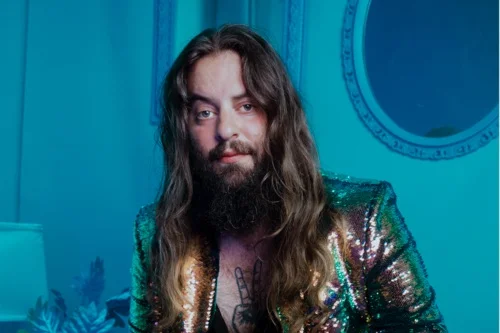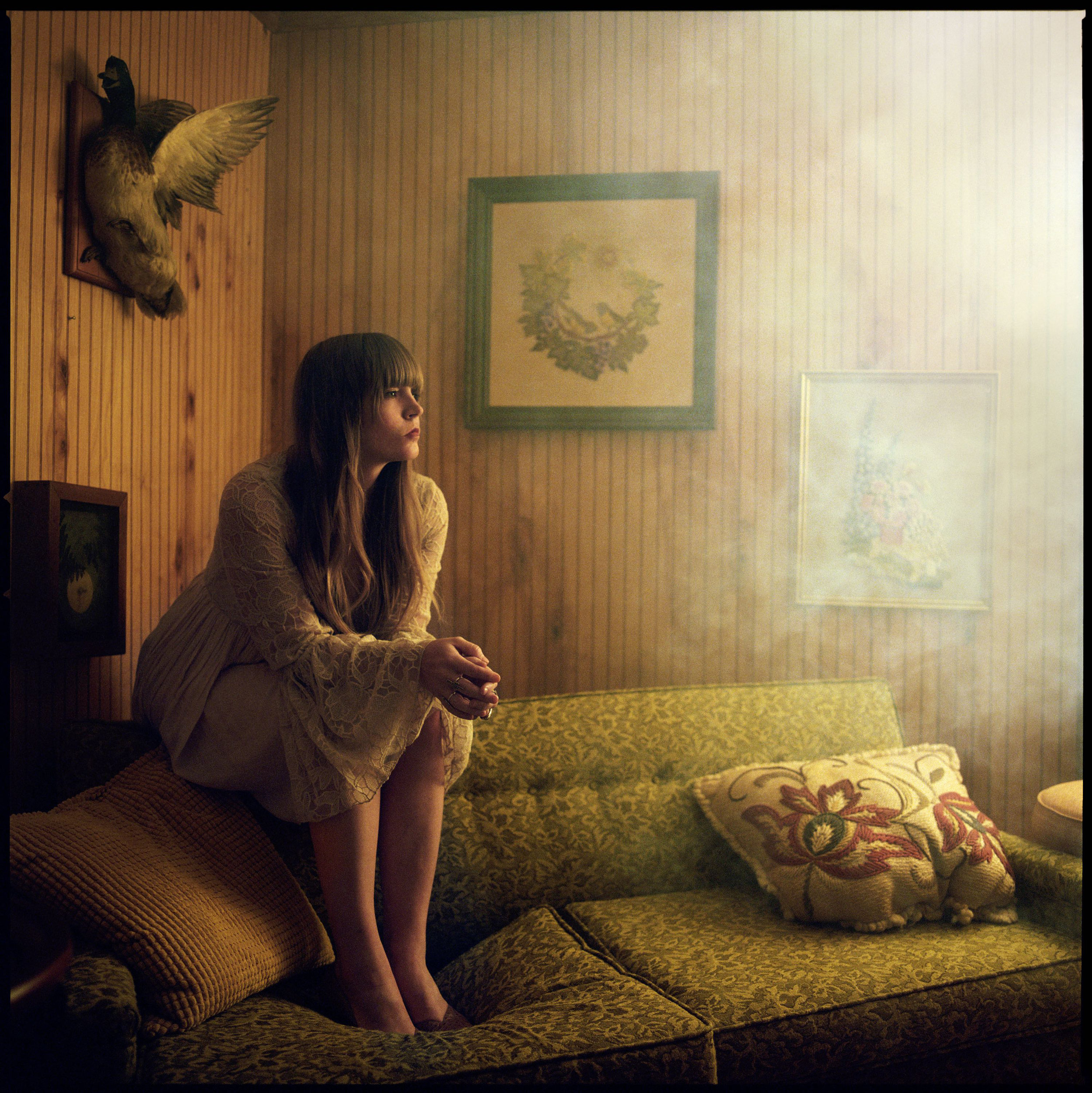The idea of ritual is an important one in the creative process. Some artists need the comfort of ritual to create, whether it’s a certain place, time of day, or even a favorite pen. Others thrive on the opposite: discomfort. It’s chaos that makes them thrive. And it’s this discomfort, this unpredictability, that has made Ariel Rechtshaid one of the most sought after and successful producers in the last decade because it’s what drives his creative instinct. He works the best when what he’s presented with—whether it’s an artist, instrument, or even chord structure—is unfamiliar to him.
Read More“Woo hoo! I feel so energized!”
This was Tim Showalter’s first reaction when I told him we were wrapping up our interview, which had gone for over an hour. His next reaction? “Let’s do this again sometime!”
I could feel Showalter, the man behind Strand of Oaks, smiling during most of our phone conversation. He loves to talk about the creative process.
Read MoreFor his latest album Phoenix, David Bazan made a lot of phone calls. To himself.
Each day, rather than journaling, he’d use the voice memo on his phone for ten or fifteen minutes to talk to himself. These calls were a “meet and greet with myself.” And through them, he got to know himself better.
Read MoreI was surprised when Courtney Barnett told me that she doesn’t like solitude when she writes. Almost all of the songwriters I’ve interviewed have told me that they need to be alone, for the simple reason that they can’t have any distractions. But when Barnett told me why she needs to be around the action, it made sense: how can you be a narrative storyteller if you write while facing a wall?
Read MoreMarissa Nadler needs to write. It’s a therapeutic necessity: she uses it to process the events in her life. By her account, her best music happens when that need arises. But even if that need disappeared, Nadler would still be able to write because she’s so disciplined.
Read MoreDon't be concerned for Eleanor Friedberger if you see her mouthing words or even mumbling to herself when she's out for a walk. It's her storytime. And it's during these times that song ideas come to her. "I tell very long and elaborate stories on those walks. True stories. As if I'm telling people a story of my relationship with so-and-so or the time that something happened to me."
Read MoreCourtney Marie Andrews needs to be alone.
That is, she needs complete solitude when she writes. Where other songwriters thrive on a bit of commotion or even chaos around them, not Andrews. She needs solitude because it provides her the best chance for self-reflection and an "uncluttered headspace" in the songwriting process. And she has to know that she's alone too. But she doesn't necessarily need to be at home when she writes: in fact, she often prefers someplace new. "I think it's more that I like to travel and feel out of my element, and I think my best songs come from that space. I lean towards writing songs in unfamiliar places," Andrews told me. Her process also involves what she calls "chunk writing." She doesn't like to write on tour; that's where she collects all of her notes for the later songwriting process. But when she gets off tour, she blocks off a two-week chunk on her calendar and does nothing but write.
Read MoreMatt Lowell of Lo Moon grew up playing hockey. "I was obsessed with it," he told me. Lowell was at the rink every day, but part of this obsession can be traced to how much he watched the sport. It was a natural extension: the first thing Lowell wanted to do after watching hockey on television was play it.
The same can be said for Lowell's love of reading. When he reads a lot, he writes a lot. And when he's not reading, writing is difficult. It's an easy connection. For the songwriters or writers reading this interview, you won't be a good writer unless you read. It's impossible. Just read the interviews on this site. The songwriters are voracious readers, and Lowell knows this. He knows that his talent as a songwriter depends on his exposure to other people's words. "I’m not really inspired by everyday life," Lowell told me. "I’m not that inspired by the things around me. But when I’m reading something, or if I see an amazing film, or if I’m jamming with my band mates, that’s when the sparks come." By his own admission, the band's schedule has kept him away from his books, and that bothers him. "I'm upset that I haven't been able to read that much," he said.
Read MoreJessica Lea Mayfield owns a blue tote bag. This in itself is not unusual: you probably have a tote bag too. But it’s not a stretch to say that Mayfield’s blue tote bag is her life. It contains almost everything she’s ever written, all the way back to when she was a child. There are scraps of notebook paper, receipts, utility bills, pieces of cardboard. And she’s written on them in pens, pencils, eyeliner, and crayons, among other things. Whenever Mayfield has a thought, she writes it down and puts it in the bag. And when it comes time to write a song, she will often dump the bag’s content all over the floor and search for an idea or a verse or phrase that fits the melody for the song she’s writing.
Read MoreEvery writer has a ritual, some consistent part of the writing process that brings them the comfort or confidence to be productive. Ted Leo has one: stacks. Stacks of things. When Leo is around the house, he carries with him from room to room a stack of pads, some pens, his phone, and his Roget's Thesaurus. And when he sets them down, they are each their own stack, not one giant stack. Almost like a fortress of words around him.
Leo's lyrics have been rightfully praised for years, and I have to think that much of this has to do with his voracious reading habit. It's not possible to be a writer unless you read. It's just not. Leo is a good example of that; he goes down rabbit holes of genres or authors or topics, especially while on tour. And these are some pretty dense topics. That's why, after one tour, Leo was able to riff about 70s urban planning in the UK and Russian constructivist architecture with ease. And while he may not have written any songs about these topics, he says that on some level all of that reading made him a better, and a more thoughtful, songwriter.
Read More
You know Dan Wilson. You may not think you know Dan Wilson, but you know Dan Wilson. How do I know that you know Dan Wilson? Because it's closing time somewhere in the world as I'm typing this and as you're reading this, and there is no way in hell that you haven't heard that song. Which, by the way, I still love.
You also know Dan Wilson because you know Adele and the Dixie Chicks. He co-wrote Adele's "Someone Like You" and the Dixie Chicks' "Not Ready to Make Nice." He won two Grammys in 2007: Song of the Year as co-writer on "Not Ready to Make Nice" and Album of the Year for the Dixie Chicks' album Taking the Long Way. He again won an Album of the Year Grammy in 2012 for Adele's album 21. The list of artists he's either written with or produced is dizzying: Taylor Swift, Nas, Pink, Weezer, John Legend, Josh Groban, Chris Stapleton, Spoon, Preservation Hall Jazz Band, My Morning Jacket, to name a very small few. He's got indie street cred too: he worked extensively on Phantogram's 2016 album Three, including a co-writing credit on every song except one.
Read MoreIf you ever email Broken Social Scene's Brendan Canning, a word of advice: don't ever greet him with "nice to e-meet you!" This is horrible, and Canning hates it. He's also not a fan of any reference to "hump day" in emails he gets on Wednesday. I agree with Canning's point, and I hate these phrases because they are lazy. Canning probably does too, but as a songwriter who creates original art, hackneyed phrases like these must especially make him cringe.
Of course, I might be reading too much into this. But Canning is always creating: he cooks, he gardens, he plays soccer, and he DJ's. "I live life with my curiosity piqued," he told me. In fact, you can often find him on the streets of Toronto on his bike, staring at people and wondering what their stories are. The important thing is that Canning is always keeping his brain going in some fashion. So if you're in downtown Toronto and notice Canning staring you down, there might be a Broken Social Scene song in there somewhere.
Read More











